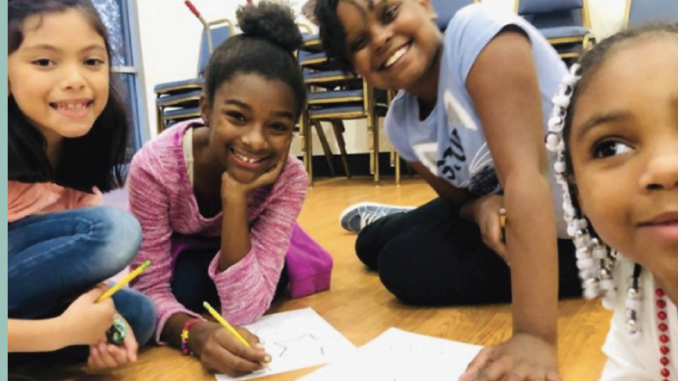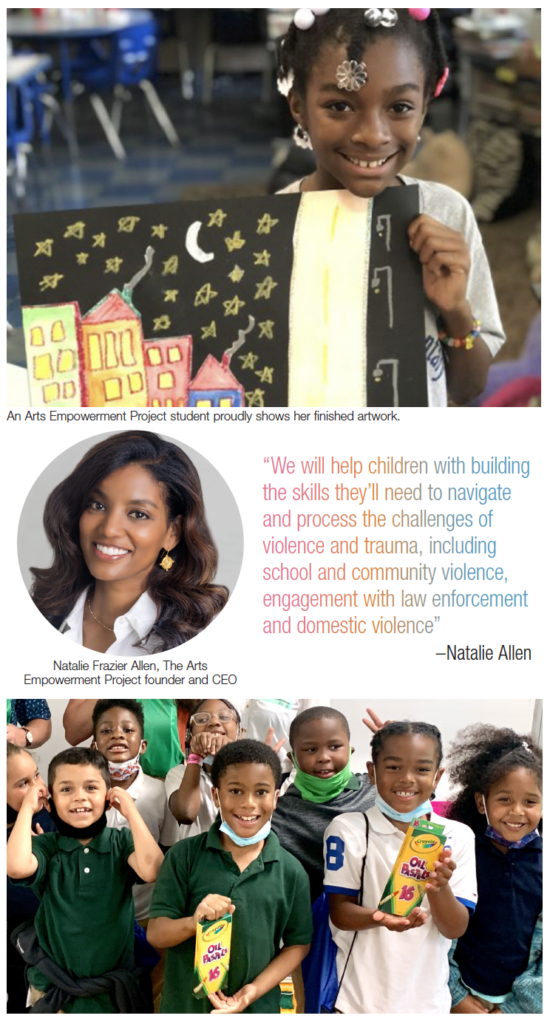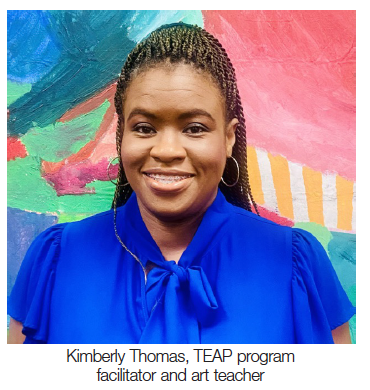
Offers Hope and Opportunity to Area Youth
The arts teach more than just how to glue pieces of construction paper together or how to color between the lines. Research shows that exposure to the arts can help young people develop many positive skills, such as persistence, collaboration, creative thinking, problem solving and motivation, that are valued by leaders and employers.
In addition, the arts can improve a teenager’s confidence and academic performance, according to Middle Earth, a nonprofit community-based agency. In Charlotte, an initiative called The Arts Empowerment Project (TAEP) provides high-quality arts programming to help children who have been impacted by violence or trauma find their voices, learn social and emotional skills, and heal through art.
“We’re not just trying to guide kids into arts careers. It’s really social capital and using arts as a vehicle to other opportunities. … It’s really opening doors for kids so they can have a view to a bigger world,” said TAEP founder and CEO Natalie Frazier Allen.
A lawyer by trade, Allen’s legal experience working with people dealing with generational intra-family violence and foster care kids eventually informed her decision to create TEAP. Founded in 2011, TEAP gives K-12 youth who have suffered trauma and adverse childhood experiences a pathway to help them remain resilient by providing them an outlet to express themselves and improving social-emotional development and life skills like management, self-awareness, responsibility, relationship skills and alternative dispute resolution.
“We will help children with building the skills they’ll need to navigate and process the challenges of violence and trauma, including school and community violence, engagement with law enforcement and domestic violence,” Allen said.
While underserved youth may be more vulnerable, TEAP is not just available to them. Allen said children and youth from other backgrounds who may benefit from the program can be referred to TEAP also, as witnessing violence and trauma has become so prevalent across society and all communities.
“Having these issues undermine our sense of safety, stability and bonding can lead to mental health problems, instability in the future, physical health problems, adoption of at-risk behaviors and impact on your life and sometimes even early death,” she explained.
As the child of a father who worked in dye-transfer printing and photo retouching, and a mother who was a choral music instructor, Allen said “art framed (her) world,” so she was an aspiring visual artist, before becoming a lawyer.
Many students today, however, may lack access to arts classes which are increasingly removed from school curriculum due to lack of funding and resources. According to Forbes.com, the arts face being squeezed out of schools because of the narrow focus on core subjects like English, math and science.
“An organization like The Arts Empowerment Project is vital for Charlotte because it connects children of all ages from underserved populations with the arts,” said Allen. “It also explores social, emotional and language aspects through self-expression and imagination to build confidence and gain new life skills.”
Allen’s experience working and advocating for at-risk children and her vision for the organization will have a lasting impact on communities throughout Charlotte,” said Kimberly Thomas, a TEAP program facilitator and art teacher.
The six programs at TEAP include Promoting Peace + Justice workshops, HeART Packs outreach programs, Free Art Days, Encounters, Art Access, and its Culinary Camp. The staff, visiting artists and guest speakers from various disciplines in the arts lead the programs which are mainly held in TEAP’s new 3000+ square foot space in Charlotte’s Visual and Performing Arts Center (VAPA) as one of VAPA’s founding member organizations.
“The most rewarding part of working with the Arts Empowerment Project is seeing students actively participate in our classes,” Thomas said. “I enjoy assisting them with the assignments and answering their questions. I also enjoy listening to the students engage in conversations with each other about all sorts of subjects. With the younger children, I love to see them sharing their work and getting excited about what they created.”
Some kids may be skeptical at first, Allen said, but then they realize TEAP is a safe space where they learn more than just art. They enjoy diversity of subject matter such as how to dress for success, prepare for interviews and spoken word performances. A testament to TAEP’s success is a former foster care child and TEAP student who is now a local chef and has returned several times to help teach culinary classes at TEAP.
“Seeing the impact on the students and getting the feedback from the students and their counselors or teachers is really the most important thing,” said Allen. “I feel like it’s working. What we’re doing and every step we’re making is working.”


